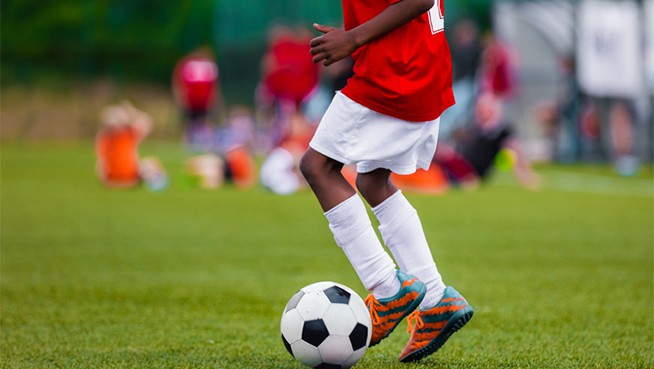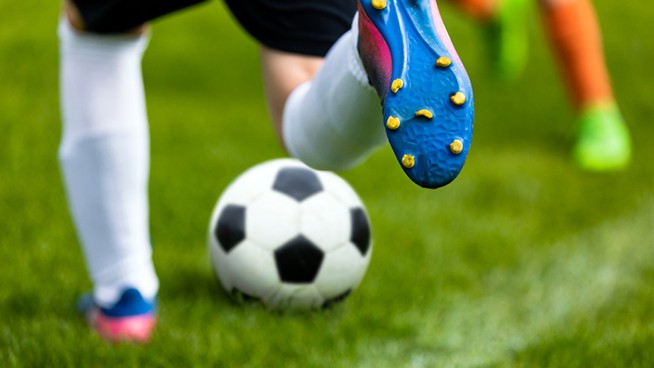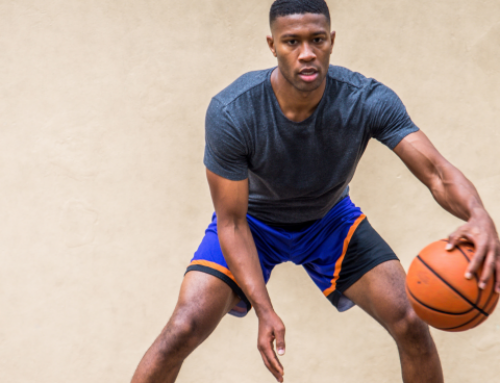How to Master the Basketball Jab Step
For most young basketball players, the ability to leave a defender in the dust is a performance goal.
But few are fast and agile enough to blow by a defender via pure athleticism.
If you want to get by more defenders, you need to learn how to read a defensive stance and then attack the weakest part of it.
This is where jab steps can be an invaluable tool.
The jab step is an essential basketball move that sees the ball-handler utilize an aggressive, “jabbing” step out of the triple-threat position. The jab step is executed with whichever foot is not the pivot foot, allowing a player to execute multiple jab steps from the same spot on the floor, should they choose to do so.
The jab step can be an awesome way to move a defender’s feet and analyze the best way to attack them before actually putting the ball on the floor. This Jr. NBA video with Shane Battier does a tremendous job of explaining the jab step and the benefits it can offer when utilized intelligently:
Battier’s cue of “squashing the bug” is great for young players, as a jab step must be aggressive if we want to draw a reaction from the defender. Battier hits on the three things basketball players should look for from the defender when utilizing an aggressive jab step:
- One, does the player react at all? If not, this is a great opportunity to push off that jab step and blow by the defender for a drive.
- Two, if the defender jumps back in reaction to your jab step to defend against the drive, you just created a tremendous amount of space for yourself to take an open shot.
- Three, if the defender flies up court to cut off the direction of your jab step, they’ve left their other side extremely vulnerable. Now you can crossover and drive in the opposite direction of your jab step.
Jab stepping just for the sake of jab stepping is largely pointless. You need to analyze the micro-situation that is the split-second of that defender reacting to your jab step, and then respond accordingly. The more you practice it, the better and faster you’ll be at analyzing and responding.
Imagine you have the basketball at the top of the key in a triple-threat position and your defender is in front of you. The distance between your right foot and the defender’s left foot is about 15 inches. You take a step with your right foot toward his left foot, shortening the distance to 8 inches. You’re already that much closer to getting by the defender. Let’s say that the defender does not react to the jab step. What should you do?
If you analyze it quickly enough, you can simply push off your jab step and attempt to blow by them. Since your weight is already moving in that direction and the defender will have to step backwards to defend you, you’re at a distinct advantage.
Now imagine you’ve just received a pass from your teammate and are in a triple-threat position on the wing. The distance between your right foot and the defender’s left foot is again about 15 inches. As you jab with your right foot, the defender takes a step backwards. Perhaps they remember you beating them with a drive earlier in that game and are now hyper-aware of defending it. What should you do?
This could be a great chance to quickly bring your jab foot back underneath you and shoot a jumper. The defender has already given you some extra space, and their weight is moving backwards, making it more difficult for them to offer a quality contest.
Carmelo Anthony has long been a master of the jab game. He has mastered the move and is very good at reading the defender and reacting quickly. This video of Carmelo teaching his son to jab step, which is also from the Jr. NBA, is awesome viewing:
Although simply jabbing in different directions and analyzing a defender, as Melo’s son does in the video above, is great practice, there are a number of other drills that can help sharpen this skill. I like to have players who are a bit more physically mature practice slamming a heavy ball during their jab step:
This helps the player realize how powerful the move can be and builds better balance and body control both during and after the jab step.
In most games nowadays, young players want to make flashy plays almost every possession. My advice: learn how to implement simple-yet-effective strategies like the jab step into your game and practice them constantly. This will help you develop confidence and allow you to create consistent scoring situations for yourself and your teammate. Young players must worry about the steak first before adding the sizzle!
READ MORE:
RECOMMENDED FOR YOU
MOST POPULAR
How to Master the Basketball Jab Step
For most young basketball players, the ability to leave a defender in the dust is a performance goal.
But few are fast and agile enough to blow by a defender via pure athleticism.
If you want to get by more defenders, you need to learn how to read a defensive stance and then attack the weakest part of it.
This is where jab steps can be an invaluable tool.
The jab step is an essential basketball move that sees the ball-handler utilize an aggressive, “jabbing” step out of the triple-threat position. The jab step is executed with whichever foot is not the pivot foot, allowing a player to execute multiple jab steps from the same spot on the floor, should they choose to do so.
The jab step can be an awesome way to move a defender’s feet and analyze the best way to attack them before actually putting the ball on the floor. This Jr. NBA video with Shane Battier does a tremendous job of explaining the jab step and the benefits it can offer when utilized intelligently:
Battier’s cue of “squashing the bug” is great for young players, as a jab step must be aggressive if we want to draw a reaction from the defender. Battier hits on the three things basketball players should look for from the defender when utilizing an aggressive jab step:
- One, does the player react at all? If not, this is a great opportunity to push off that jab step and blow by the defender for a drive.
- Two, if the defender jumps back in reaction to your jab step to defend against the drive, you just created a tremendous amount of space for yourself to take an open shot.
- Three, if the defender flies up court to cut off the direction of your jab step, they’ve left their other side extremely vulnerable. Now you can crossover and drive in the opposite direction of your jab step.
Jab stepping just for the sake of jab stepping is largely pointless. You need to analyze the micro-situation that is the split-second of that defender reacting to your jab step, and then respond accordingly. The more you practice it, the better and faster you’ll be at analyzing and responding.
Imagine you have the basketball at the top of the key in a triple-threat position and your defender is in front of you. The distance between your right foot and the defender’s left foot is about 15 inches. You take a step with your right foot toward his left foot, shortening the distance to 8 inches. You’re already that much closer to getting by the defender. Let’s say that the defender does not react to the jab step. What should you do?
If you analyze it quickly enough, you can simply push off your jab step and attempt to blow by them. Since your weight is already moving in that direction and the defender will have to step backwards to defend you, you’re at a distinct advantage.
Now imagine you’ve just received a pass from your teammate and are in a triple-threat position on the wing. The distance between your right foot and the defender’s left foot is again about 15 inches. As you jab with your right foot, the defender takes a step backwards. Perhaps they remember you beating them with a drive earlier in that game and are now hyper-aware of defending it. What should you do?
This could be a great chance to quickly bring your jab foot back underneath you and shoot a jumper. The defender has already given you some extra space, and their weight is moving backwards, making it more difficult for them to offer a quality contest.
Carmelo Anthony has long been a master of the jab game. He has mastered the move and is very good at reading the defender and reacting quickly. This video of Carmelo teaching his son to jab step, which is also from the Jr. NBA, is awesome viewing:
Although simply jabbing in different directions and analyzing a defender, as Melo’s son does in the video above, is great practice, there are a number of other drills that can help sharpen this skill. I like to have players who are a bit more physically mature practice slamming a heavy ball during their jab step:
This helps the player realize how powerful the move can be and builds better balance and body control both during and after the jab step.
In most games nowadays, young players want to make flashy plays almost every possession. My advice: learn how to implement simple-yet-effective strategies like the jab step into your game and practice them constantly. This will help you develop confidence and allow you to create consistent scoring situations for yourself and your teammate. Young players must worry about the steak first before adding the sizzle!
READ MORE:












